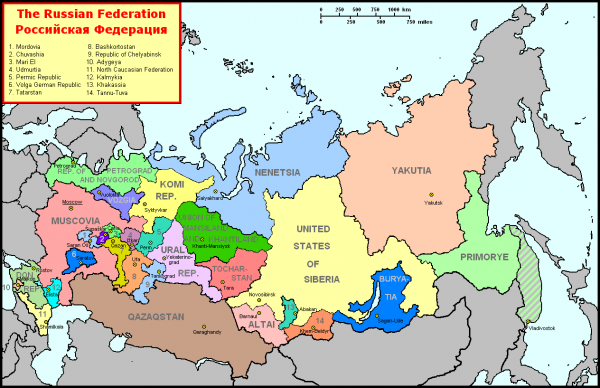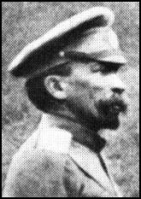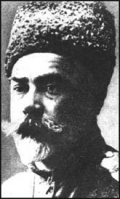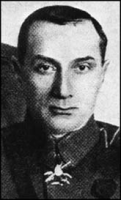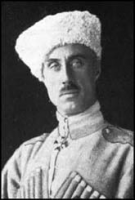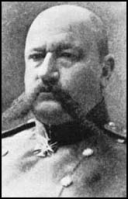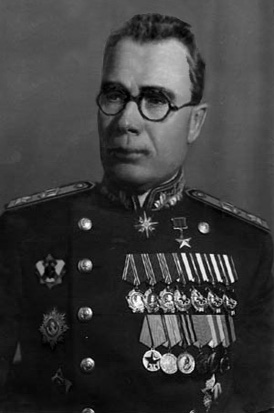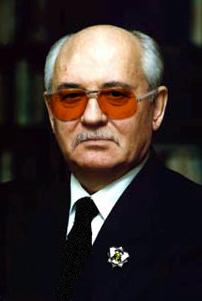Russia
| Conventional short name: | |
| Local: | Россия |
| English: | Russia |

| |
| National motto: Съ нами Богъ! (God is with us!) | |
| Languages: | |
| Official: | Russian |
| Others: | About a hundred other languages |
| Cities: | |
| Capital: | Moscow |
| Other: | Arkhangelsk, Astrakhan, Chelyabinsk, Irkutsk, Kazan, Nizhni-Novgorod, Novgorod, Novosibirsk, Omsk, Orel, Penza, Perm, Petrograd, Pskov, Rostov, Samara, Saransk, Saratov, Syktyvkar, Tomsk, Tver, Ufa, Vladivostok, Vologda, Vyatka, Yekaterinograd |
| President: | Igor Arensky |
| Prime minister: | Georgi Kustov |
| Area: | AREA |
| Population: | POPULATION ADJECTIVE |
| Established: | 1991, but independent since the Middle Ages |
| Currency: | rouble (no subdivisions) |
| Organizations: | - |
General information
Russia is a huge confederation, stretching from Petrograd to Vladivostok. In recent times, it has become democratic, though corruption is rife. Until 1991, Russia was ruled by the SNOR regime, and elements of this are still strong in Russian politics today, though the party itself has been banned.
Administration
Government
HOW GOVERNMENT IS ORGANIZED: not too well!
Administrative Divisions
Russia is a federation, consisting of 29 republics:
| # | Flag | Name | Area (km²) |
Population (x 1000) |
Capital |
|---|---|---|---|---|---|
| 1 | Adygeya | Majkop | |||
| 2 | Altai | Barnaul | |||
| 3 | Başqortostan | Ufa | |||
| 4 | Buryatia | Sagan-Ude | |||
| 5 | Chuvashia | Saran Oš | |||
| 6 | Don Republic | Rostov-na-Donu | |||
| 7 | Kalmykia | 76,100 | 318 | Elista | |
| 8 | Khakassia | Abakan | |||
| 9 | Komi Republic | 448,670 | 1,017 | Syktyvkar | |
| 10 | Mari-El | Ižkar | |||
| 11 | Mordovia | Šupaškar | |||
| 12 | Muscovy | 1,056,800 | 49,340 | Moscow | |
| 13 | Nenetsia | 1,879,750 | 588 | Salyankhard | |
| 14 | North Caucasian Federation | 3,516 | Shamilkala | ||
| 15 | Perm Republic | 127,360 | 2,791 | Perm | |
| 16 | Primorye | 1,354,200 | 4,823 | Khabarovsk | |
| 17 | Qazaqstan | 41,300 | 1,142 | Qaraghanda | |
| 18 | Republic of Chelyabinsk | 3,900 | Tankograd | ||
| 19 | Republic of Petrograd and Novgorod | 529,800 | 9,520 | Petrograd | |
| 20 | Republic of the Volga Germans | Saratov | |||
| 21 | Tannu-Tuva | Khem-Beldyr | |||
| 22 | Tatarstan | Qazan | |||
| 23 | Tocharstan | Tara | |||
| 24 | Udmurtia | Ižkar | |||
| 25 | Union of Mansiland and Khantiland | Khanti-Mansiysk | |||
| 26 | United States of Siberia | Novosibirsk | |||
| 27 | Ural Republic | 407,800 | 9,305 | Yekaterinograd | |
| 28 | Vozgian Republic | 153,200 | 1,405 | Vuolokta | |
| 29 | Yakutia | 950 | Yakutsk |
Apart from these republics, the following territories have a special status:
- Autonomous districts within the Republic of Petrograd and Novgorod:
- the Votian-Izhorian Autonomous District (Vodsko-Izhorskyj Avtonomicheskyj Okrug)
- the Ladogo-Onegian Autonomous District (Ladozhsko-Onezhskaja Avtonomicheskyj Okrug)
- Within Primorye:
- The Russo-Japanese Condominium Area (East Primorye)
- Within Qazaqstan:
History
(Taken from http://steen.free.fr/ib/index.html)
Before 1914
Let's assume, that Russian history *here* and *there* has been more or less the same until the beginning of the Great War in 1914. A major difference, however, is that Russia was less vigorous in its colonisation tactics than *here*; as a result, the minorities are more numerous and generally better developed. Even the later russification politicies of the SNOR regime couldn't undo that.
The Great War (1914-1917)
Politically, Russia had a lot in common with Germany, Austria, and Hungary, but for various - mainly geopolitical - reasons, it ended up in the Allied camp. Russia did its very best in the struggle with the Central powers, but partly because of the czar himself's incompetent military leadership, the war became a disaster for Russia.
In February 1917 the czar was overthrown and a provisional government, liberal/social-democratic in signature, was installed; in November 1917, the Bolsheviks seized power. In December 1917, Russia eventually surrendered, and the peace treaty of Brest-Litovsk was signed. Russia lost a considerable part of its territory: Estonia, Latvia, Belarus, Ukraine, Moldova, the Crimea, Georgia, Azerbaijan and Turkestan became independent states, mostly under German control, while Lithuania was expanded with huge portions of previously Russian territory.
The Civil War (1917-1919)
In the West, the War ended in a stale-mate, as a result of which the pre-war borders were restored. Russia, however, was the scene of a civil war between the Bolsheviks, who were still in power at the time, the former provisional government, the pro-czarist White forces, and the so-called Green forces, consisting of several loose formations without a clear political agenda.
Until this moment, history has been more or less the same as *here*.
With the help of German regiments that had gotten their hands free after the peaceful end of the war in the West, the pro-czarist White army succeeded in gaining power over the Bolsheviks. The entire leadership of the communist party and the Red Army were either executed or had to escape the country (mostly to the neighbouring countries in Central Europe, where they would fruitlessly try to mobilize support for their lost cause during the next decades); a few or them went underground.
The years 1919-1934
The generals' initial intention had been to restore the power of the czar, even though they shared the common opinion that the czar was personally responsible for the Russian fiasco in the Great War. However, the czar and most of his family had been wiped out by the Bolsheviks, and in a strange way, the generals were grateful to them for that fact.
The czar's eldest son Aleksei, however, who was the heir to the throne, had survived the massacre for some mysterious reason. After the generals consolidated their power in Russia, Aleksei succeeded his father at the ago of fourteen. But Aleksei was both physically and psychologically very unstable; real power rested safely in the hands of the generals, who formed a junta-like collective body, the White Council, officially only a board of advisors to the czar.
- The White Council in 1919
Aleksandr Kolchak (1873-1937)
During the first years of their leadership, ideology didn't play a major role, apart from phrases about "rebuilding Russia" and "restoring our national pride". But the country was still heavily damaged as a result of two wars; people suffered hunger; and the popularity of their left-wing opponents grew steadily. The generals were realistic enough to realize that revolutionary spirit was still in the air, and that the catastrophal year 1917 could easily repeat itself. Thus, in an attempt to gain popular support (and to avoid a new civil war) they founded the Union for the National Renewal of Russia (Soyuz Narodnogo Obnovleniya Rossii, SNOR) in 1923.
The program of the SNOR was ardently nationalist. The generals portrayed Russia as the poor victim of the rich West (not only Germany, but equally France and the Federated Kingdoms) and announced a huge pay-back to those who had brought misery to Russia. Russia's broken national pride had to be restored by the violent requisition of every lost territory and severe punishment of those who were considered guilty. Ultimately, they wanted the Third Rome to become the ruler of a huge territory between the Pacific, the Atlantic, and the Indian Oceans. In their messianistic propaganda, the Russian nation appointed by God as the saviour of the world. Non-Russian national minorities on the other hand were accused with numerous charges, including collaboration with every possible enemy and profiting from the country's national resources more than they should (i.e. taking from the Russians what does not belong to them); they were considered a serious threat to Russia's national awakening and therefore severely oppressed.

Another important factor in the SNOR's ideology was Russian Orthodoxy. Even more than the language, it was considered a vital constituent of the Russian national spirit, and as such heavily promoted. The Russian Orthodox Church could highly benefit from this situation and became an ardent supporter of the regime, even though a patriarch had to be killed first to achieve that purpose.
Other elements that played a role in the SNOR ideology were anti-communism and panslavism.
Needless to add that the SNOR did not recognise the Treaty of Brest-Litovsk, which it called "an act of bolshevism". From its earliest beginning, the SNOR had always been determined to reverse the "shameless selling out of the country".
As I mentioned earlier, czar Aleksei was, as they called it, "slow in his development", and apart from that he suffered from a very poor physical health. As a result of all this, he had little power, and as far as he had any, he wasn't able to exercise it. He was nothing but a puppet in the hands of the generals. As he grew up, however, he would become deeply religious and nonviolent. The influence of his religious mother and Rasputin, constant cosseting because of his haemophilia, the close and loving relationships in the royal family, regret and grief at the death of his family might all cause the sentimental type of spirituality so typical of Russian novels. He would slowly, timidly start to defy his military mentors (widely hated by now) and become a popular champion of religion and of the Tsarist father-children relationship with the peasantry. In 1934, he appointed several clerics (Rasputin included) into the White Council, which - officially - was still his body of advisers. Thus he laid the foundation for the later almost-schism in the SNOR in the 1970s.
Unfortunately, in 1934 he died at the age of 29 (officially as a result of his poor health; some suspect the regime had something to do with his death, but this has never been proven). Although he had gotten married a few years earlier - to a certain Yevdokiya - he was still childless.
Not that there were no candidates for succession. Another important surviver of the royal massacre of 1918 had been archduke Mikhail, a nephew of czar Nikolai II. Mikhail, who was three years older than Aleksei, was often seen at the imperial court during those years. They were close like brothers, especially after their family had been massacred. But in the years 1921-1923 Mikhail studied in England. During his absence, the generals banned all political parties and founded the SNOR, while Rasputin's influence on Aleksei grew. As he understood quickly after his return, it had been a cardinal mistake to leave the country: nobody was happy to see him, including Aleksei, who couldn't forgive him for leaving him alone such a long time. The intelligent Mikhail didn't hide his concern about the political developments and was strongly opposed to Rasputin's omnipresence at the imperial court. After repeatedly denouncing the SNOR in public he became a symbol of opposition against the regime. The generals feared for their position, especially since Mikhail was the only heir to the throne and there seemed to be no improvement at all in Aleksei's health. After a period of constant harassment by the military and three unsuccessful attempts at his life, Mikhail was finally forced to leave the country in 1929. He returned to England, where he became a successful businessman. In 1942 he was killed by a Russian agent.
In short, after Aleksei's premature death, the throne remained vacant. The germ of a possible rivalry growing up between the military and the church was laid. The regime never formally admitted his death: for the next 42 years, the czar would always be "temporarily indisposed due to a cold, but he will soon resume his official duties."
The Second Great War
In 1937, admiral Kolchak, the Supreme Leader of the Russian Empire, died of old age. He was succeeded by general Iosif Vissarionov. In the beginning, the generals Denikin and Kolchak had only raised their eyebrows, when the young, illiterate farmer Vissarionov showed up in their ranks. They had a really good laugh as he tried to obtain a minor position in their government - but nevertheless gave it to him. Twenty years later their laughter would eventually be over, when Denikin and Wrangel had to confess all possible crimes - including communist sympathies and cooperation with Western secret services - in one out of many show processes that lead to as many death penalties.
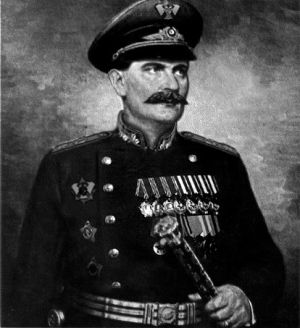
It was Vissarionov who eventually helped Russia through the Second Great War, which lasted from 1939 till 1949. The fact that the SNOR wasn't communist does surely not mean that they were sweeties. In a way, they were even worse than the communists, and with its ideology, a mixture of Russian nationalism, Pan-Slavism, militarism, anti-communism, and Russian Orthodox fundamentalism, the SNOR is probably the closest thing Ill Bethisad has ever had to fascism. Unlike the communists, however, the SNOR had no interest in spreading its ideology over the world, and therefore, its foreign policy was much more directed to the inside. The only countries SNOR-ruled Russia was really interested in, were Ukraine, the Danubian Confederation, and Nassina, because they were populated by Slavs. One of the long-term objectives of the SNOR was to incorporate them entirely into Russia. The occupation of other countries (Estonia, Latvia, Hungary, the Romanias) had no other purpose than "unifying Slavic territory", keeping close to the afore-mentioned states, or creating a buffer zone against possible threats from the West. There was definitely no intention to conquer countries like France, Germany, or the Scandinavian Realm.
As for Russia's policy during GW2: initially, there was cooperation with the - previously much hated - Germans, who were now entirely dominated by the Prussian king and his aide, field marshall Adolf Hessler. In 1936 the Großartige Allianz was established by Germany, Russia and Greece. Later it would be expanded with Hungary (1937), Belarus, Ukraine and the Danubian Confederation (all 1939). This cooperation with Germany also included a secret deal to divide Central and Eastern Europe into spheres of influence, the infamous Lipov-Von Korff pact, concluded in 1939. Both treaties enabled Vissarionov to regain most of the territories lost by Russia in the First Great War. First, in September 1939, Russia invaded and conquered Nassina and Lithuania, while Germany did the same in Veneda, and Estonia, Latvia, and Moldova followed. However, a war between Serbs and Croats would spawn such amounts of mutual distrust between Russia and Germany, that their initial friendship turned into animosity, followed by a full-fledged war in 1943. In 1946, Russia would conclude a separate peace with the Allies. When the tide turned, Russia overwhelmed much of the German-occupied territory, and managed to "liberate" several countries: Ukraine, Belarus, Lithuania, the Baltic states, Hungary, Slevania, Oltenia, Muntenia, Moldova and the Crimea. In the same way, Russia got hold of Georgia, Azerbaijan, Turkestan and Uyguristan in Asia. Subsequently, Russia tried to liberate Veneda and Bohemia as well, but the nuking of Łódź stopped the Russians from advancing; at last, the Allies called a meeting of Allied leaders in Visby, where Russia was more or less forced to accept that the RTC and Nassina would be restored, in return for which Russia would be allowed to keep the other countries it had liberated temporarily occupied, the former Ladogian Republic (merged 1940 with SIS-ruled Nassina) was accepted as Russian integral territory, and Belarus would be expanded with large parts of Lithuania.
Thus, Vissarionov gained control over most of Eastern Europe. The Slavic countries were provided with SNOR-like regimes with the same ideology; Ukraine was of course renamed to "Little Russia", and anyone who would even mention the word "Ukrainian" was discarded as a nationalist and a separatist, and was subsequently removed from the scene. The non-Slavic countries (Estonia, Latvia, Slevania, Hungary, Muntenia, Oltenia, Moldova) were treated differently, but in general the received a more junta-like regime à la Pinochet - without a clear ideology, but completely obedient to Russia. In Asia, a similar pattern was followed in Georgia, Azerbaijan, Turkestan, and Uyguristan (the latter had been a part of China before China's ultimate defeat in the Great Pacific War). With the exception of Nassina, where the regime was crushed by a popular uprising in 1948, all these regimes remained in power until the years 1989-1990.
The years 1949-1958
Russia's foreign policy during the first decade after the Second Great War was dominated by two factors: the consolidation of its power within the new satellite states, and its relationship with the Confederation of Soviet Danubian States.
Russia and the CSDS were sworn enemies, both because Russia saw it as its sacred task to liberate its Serbian and Bulgarian brothers (the Croats and Slovenes didn't really count; they were considered distant cousins at best) from their communist oppressors, and because Russia saw it as a means to expand its influence over the Balkans. Hence, Russia and the CSDS were almost permanently in a state of cold war with each other; the CSDS borders with the Romanias and Hungary were as militarised as the DMZ in Korea or Berlin, with occasional skirmishes along the border and refugees both ways (most likely Magyars and Romanians trying to get into the CSDS, Serbs and Bulgars trying to get away from it).
Despite the fact that Broz was a powerful and dangerous enemy, Vissarionov was determined to invade the CSDS and take it by force. To achieve that, he started to beef up the Hungarian army in 1954-55, but the plan fell through when the Hungarian Revolution erupted on 23 October 1956. The direct reason for this revolution were demonstrations of Hungarian students and workers in support of civic disobediance in Estonia (perhaps instigated by Directorate 1 agents from the CSDS, sent there by Broz who foresaw the impending invasion). After AVH (or disguised Dir.1 agents) opened fire on them, then the police and most of the army present joined the demonstrators in kicking off the revolution.
Russia managed to regain control over Hungary, but any plans to invade the CSDS were discarded, as SNOR would view the Hungarians and probably the other satellites too as unreliable to engage in a military operation against the CSDS - even if only Russian troops were used, they'd have to get through Hungary or the Romanias first...
Russian control over its satellites - Estonia, Latvia, Slevania, Hungary, Muntenia, Oltenia, Moldova, Ukraine, the Crimea, Georgia, Azerbaijan, Turkestan, Uyguristan, and Mongolia - remained unstable, though, despite the presence of huge amounts of Russian troups on their territories. Muntenia's leader Gheorghe Milţeanu, whose ideology was close to the SNOR, reigned his country with terror, but instead of being servile to Moscow he developed his own independent foreign policy of cooperation with the CSDS and the West. In Oltenia, the SNOR caused ethnic tension by favouring the Serbian population over the Romanian, and by using members of the Hungarian minority for the dirty work (secret police, etc.) in order to direct the population's hostility against the Hungarians and distract it from the Serbs and the SNOR itself. In Moldova, the most servile of Russia's satellites, Russia made effort to artificially boast up the share of Russians and Ukrainians by enhancing emigration there; while the figurehead president himself was a Moldovan, most other powerful positions were held by Russians and Ukrainians, which eventually caused an increased popularity of "Romanism" among the Moldovans. And in Hungary, after the death of the old regent in 1975, an ideological change took place that turned it into the most liberal of all countries under Russian domination.
The years 1958-1971
During the last years of his life, Iosif Vissarionov suffered from severe paranoia. He surrounded himself with sycophants, and his regime became more and more oppressive. But despite the outrageous amount of terror and violence he used against his subjects, popular discontent grew. The national minorities, tired of the severe russification programme and inspired by the developments in Estonia and Hungary, started demanding autonomy. In several places riots broke out.
When Vissarionov eventually died in 1958, he was most or less autmoatically succeeded by his personal aide, general Andrei Vlasov. Despite his nationalist fanaticism, Vlasov had been a fairly competent general during the Second Great War. Both facts, in combination with his unconditional dedication in carrying out Vissarionov's orders, helped him survive the various purges of the 1950s. In 1952 he had become a member of the White Council, and in 1954 Vissarionov had officially appointed him his deputy.
Vlasov was a weak leader who was unable to cope with the chaos he inherited from his predecessor. He lacked the qualities Vissarionov had had, and he lacked reliable subordinates as well. The other members Russia's leadership hated him, but they did not fear him. As it became apparent to Vlasov that he would never be able to match up against his mentor and predecessor, he quickly lost interest in the affairs of state, became addicted to alcohol and morfine, and dedicated most of his time to his sexual excapades. In the meantime, the persecution of non-Russian national minorities continued and intensified, and so did social unrest.
Due to internal pressure and the fear of collapse, the White Council put Vlasov aside in 1961, and a more moderate ruler, Yevgeni Lipov, took over power. Unlike his precedessors, Lipov was a civilian and not a military, and he never wore a uniform. He had in fact been the first civilian member of the White Council, which before that had merely been a club of generals. In his capacity of Vissarionov's minister of foreign affairs he had been the architect of the Lipov-Von Korff Treaty, in which the Holy Roman Empire and Russia divided Europe into sphere of influence. Later, he became prime minister.
Lipov understood that the minorities had to be granted some limited form of regional autonomy, and in the mid-sixties, he abolished the old imperial administrative subdivision, which completely neglected ethnicity or language, and introduced national territories instead. This policy was not only motivated by propagandistic reasons; he genuinely wanted to find a solution for them. Needless to say that he encountered much opposition within the SNOR; after all, his policy went diametrically against the SNOR's ideology. But finally, even the most ardent fundamentalists had to accept that minorities did exist in Russia, and that one way or another the SNOR had to cope with them. And indeed, ideology became less important over the years: when it came to political control over the satellite countries, the SNOR would have sponsored even the Devil himself! Nevertheless, the existence of territorial entities for national and religious minorities didn't solve anything: besides a few concessions, the oppression of minorities continued, and adherents of other religions were still subjected to forceful conversions and the like. Obviously, as later developments show, this ambiguous policy would only accelerate the dissolution of the country.
"The Thaw", as historians would later call the period under Lipov's rule, came abruptly to an end in 1971 with the sudden and somewhat mysterious death of Lipov.
The years 1971-1989
From the late sixties onwards, the SNOR became more and more populated with people who completely did not believe in the party's original ideas and used them only as a façade to hide their blind pursuit for their own personal interests. Corruption grew to inconceivable proportions. The government was guided mostly by opportunism and used its own ideology merely as a legimitation of its actions; it didn't care too much about the disasterous state of the economy, lost any feeling with the people, and didn't even notice the growing popular discontent. This situation reached its peak under Lipov's successor, marshall Pyotr Popovich.
By the time Popovich took over, in 1971, the SNOR consisted of several factions. These should not be understood as groups or blocs within the party, but rather as ideological currents. They did not exist officially, and especially not publicly; it was mostly a matter of certain people disagreeing with certain other people, and certain third people being more inclined towards either the former or the latter. In Russia itself such differences were usually swept under the carpet, and recognising them was mostly the business of Kremlin watchers in the West. Factionalism within the SNOR had existed since the late 1920s, although it had been suppressed under Vissarionov and Vlasov, and was allowed to resurface only under Lipov. The most important of these factions were the military faction and the religious faction. The former represented everything the generals had always stood for: power, law and order, nationalism, military virtues, industrialisation, progress, etc. The religious faction, on the other hand, favoured a return to more traditional values, especially the religious ones, and envisioned the total merger of church and state. Although Russian Orthodoxy was a major factor in snorist ideology from the beginning, and the patriarch of the Russian Orthodox Church qualitate qua had been a member of the White Council since 1934 (as a "spiritual and moral adviser"), the influence of the Orthodox faction had always been limited. That was about to change.
Marshall Popovich belonged to the military wing of the SNOR, but in spite of that, he was primarily the representative of the regional establishment - faceless people, who feared Lipov's reforms might jeopardise their own comfortable positions. Under his rule, these reforms were put to an end and partially reverted. The non-Russian populations were allowed to keep their territorial units, but simultaneously they were persecuted more intensively. Political opponents of the regime, including some former coryphees of the Lipov administration, were rarely killed, but locked up in prisons, Siberian labour camps and psychiatric hospitals instead. The economical situation in the country did not improve at all: Popovich built up huge foreign debts by loaning vast sums of money abroad. In addition, he tried to fight the problems by printing more money, thus causing an inflation so huge that even artificially protecting the value of the ruble could not save it from falling. Corruption flourished, and Popovich himself, instead of being a true leader, was rather on top of an elaborate clientele system. By the time he died of a food poisoning in 1976, the SNOR, and especially the generals, had lost their last moral authority.
And so, when Popovich died, power was temporarily assumed by the patriarch of the Russian Orthodox Church, Dmitri Ivanovich Razin, in his capacity of eldest member of the White Council. But before a new leader could be elected, Razin died as well, and another cleric, now the eldest member of the Council, took the seat. His name was Dmitri Spiridonov. At this point, the Russian Orthodox Church seized its chances, and, moving quickly, named him the new leader of the church. Due to the prestige, and some judicious propaganda, they managed to force some of the other factions to confirm him permanently in his post of Supreme Leader of the Russian People.
It was obvious that Spiridonov, who was already in his late eighties, would merely be an intermezzo in order to avoid the struggle for power from escalating even further. He died less than a year later, without having been able to accomplish anything significant.
Then what happens? The ROC was still in charge and being SNOR leader ánd patriarch at the same time had now more or less become an automatism. Church and state were thoroughly interwoven. Yet, the position of the church was still far from secured, since both the military and the industrial factions were very unhappy with the church turning back the clock. Only by gaining the support of the military, the church managed to narrowly hold on. The result was a compromise: the openly militaristic metropolitan of Petrograd, Porfiri Bogolyubov, who had been pushing to succeed Spiridonov as patriarch of the Russian Orthodox Churcy, also become the new leader of the SNOR.
In the first years of his rule, Bogolyubov did a bang-up job of it. From the beginning, his policy had been inspired by religious convictions; he claimed God gave him advices directly about how to run the affairs of state. He fought corruption - successfully to some degree - and under the banner "Men are my children, all created equal" he introduced "equality in front of the law" and a certain amount of freedom of speech. Unlike his precedessors, who had always claimed czar Aleksei was still alive but "temporarily undisposed due to a cold", he immediately revealed that the czar had been dead since 1934, and announced that he would be looking out for a legitimate successor. He even contemplated the possibility of free elections, although it never came that far. Simultaneously, he tried to impose a strict religious and moral law reform: no fornication, no booze, etc. Since they are "morally superior", he started appointing clerics to key posts instead of civil servants and military.
But the longer he ruled, the odder his behaviour became. He came to believe that he was an illegitimate son of Grigori Rasputin, and declared him a saint by decree in 1979; in 1980 he did the same to admiral Kolchak. Subsequently, he became convinced that he was a living saint himself, and had himself sanctified as well. He had millions of golden icons made of himself, and they could be found in every church. He forcefully converted entire non-Orthodox populations to Russian Orthodoxy, and under his rule, thousands or musea, libraries, sports halls etc. were turned into churches. Books of non-Russian authors were burned, cafés and restaurants were closed, and musical instruments were forbidden. He created a special police force with the sole purpose of checking the church-going habits of the population. The commands God gave him became stranger and stranger as well: in 1983 he had Russia's entire population of cows slaughtered, because he claimed God had told him: "Thou shalt not eat the flesh of the holy cow, nor shalt thou drink its milk". Bogolyubov had himself crowned czar in 1981.
The last straw was his crusade against all "heathen" nations, non-Orthodox Christian countries included. In 1980 Russia invaded the Moghul National Realm, and in December 1981 it nearly came to a war with the Republic of the Two Crowns. No matter how fanatical, most members of the White Council recognized the folly of all this. In January 1984, he suddenly vanished without a trace. His followers claimed they had seen him spreading his angel's wings and flying up to heaven. Only nine years later, he was found in a monastery near Novgorod, raving all kinds of religious nonsense and his memory completely erased. It was never proven that this man, who died shortly afterwards, was indeed Bogolyubov.
The truth is that Bogolyubov had been removed in a coup. The country was now near bankruptcy, the church had lost all the credits it had ever had, and a popular uprising seemed at hand. Vitali Zeleznev, the head of the Oprichniki, the secret service, became the new leader of the SNOR, and he enjoyed the support of both the army and the industry. The czarist throne remained vacant. Zeleznev never had the ambition to become a true "Supreme Leader of the Russian People" himself; he merely understood, that a coup was the only way to keep the SNOR in power. He had no intention of granting any more liberties to the population than they already had, and merely tried to go back to the good old days of state control. However, there were no signs that the people were going to accept that. Despite his madness, Bogolyubov had generally treated them more kindly than his predecessors and given them a taste of freedom. Under the pressure from the inner circle of the party, Zeleznev resigned after one and a half year, handing over power to Mikhail Gorbachenko.
The relatively young, sophisticated and charismatic Gorbachenko was launched as the ultimate savior of both the state and the party. He was well-known as a media personality, and had been very successful as the governor of Don Gubernia. He intensified his predecessor's battle with corruption, which still was very strong in Russia, and replaced many White Council members, governors and other high-ranking officials (most of whom were already in their seventies and eighties) with a new generation of more progressive and realistic leaders. It was not his intention at all to turn Russia into a democracy. He merely understood that the SNOR would never be able to rule much longer without the true support of the Russian people. Thus, he promised more openness on the part of the state (glasnost'), a stronger separation of party, state and church (perestrojka), and a limited degree of democratization (demokratizacija) that would allow the people to choose between several candidates for a post instead of the usual one. He also started a diplomatic offensive in order to gain some support for his cause abroad, which gave him quite some popularity in the West.
The fall of the SNOR (1989-1991)
By the time Russia's new leadership under Gorbachenko took over, the country's economy was in a deplorable state and the regime was ideologically bankrupt. Gorbachenko's reforms were aimed at streamlining the state and restoring the SNOR in its old glory. However, by allowing a level of democracy and freedom of speech, he opened a can of worms he hadn't expected, and people unexpectedly started fighting the SNOR state itself. They massively started electing non-party officials, numerous new anti-government newspapers emerged, and even most of the existing ones started following the SNOR critically. What followed was an outburst of popular discontent, in the forms of both anti-snorism, anti-Russian nationalism among the numerous non-Russian nationalities, as well as regional separatism. Initially, Gorbachenko tried to calm down the situation by giving the provinces a higher degree of autonomy, but his concessions, meant to restore peace, turned out to achieve quite the opposite. The more freedom he gave to the regions, the more he lost control over them. In addition, the SNOR itself was increasingly divided between those who supported Gorbachenko, those who were radically opposed to the reforms and those to whom the reforms did not go far enough.
In the same period Gorbachenko lost his grip on Russia's satellite states. Little time was needed before it became strikingly obvious how weak the base of their snorist puppet governments had been all the time. In 1989 and 1990, one snorist regime after another was overthrown, either from within the system itself or by means of a revolution. Interestingly, when the case of the SNOR was already a lost one, Russia still succeeded in creating one more satellite state in Eastern Europe: it was the motor behind Bulgaria's secession from the CSDS in 1988, and thus played a key role in the beginning of the Great Balkan War. By supplying the latest tanks and Lavochkin fighters to Bulgaria fairly quickly (and, as we may assume, by the very possibility of a Russian invasion in the CSDS), Russia helped Bulgaria secure her independence. In return for this favor, the Bulgarian government aligned itself happily with the SNOR, and this government - corrupt as it is - is still in firmly power in Bulgaria.
The fate of the snorist regimes in Russia's neighboring states also had its impact on Russia itself, notably among its non-Russian minorities. Snorist policy had traditionally been directed at ignoring and slowly assimilating minorities, not within the framework of nationality-based regions, but rather the opposite. The autonomous provinces that had been created in the 1960s, in a relatively liberal period in Russian history, were rather about folk dancing and establishing a few non-Russian schools and publishing a few non-Russian newspapers than about any real self-government. The newly acquired freedom of speech led to a quick reawakening of national consciousness, and one thing became abundantly clear: that Russia was still a multinational state, doomed to fall apart sooner or later. Numerous informal political organisations were formed spontaneously everywhere, most notably the so-called popular fronts in support the reforms, mass organisations consisting of apolitical people and partly also of reformists within the SNOR. Their main objective was, initially, a larger degree of autonomy for their provinces. They were quickly joined by entire local SNOR organisations, and soon the SNOR started to crumble from within.
By the time Gorbachenko understood that his new policy was working against the SNOR instead of reinforcing it, it was too late to reverse it. In a desparate attempt to get the situation under control, he responded with brutal military violence. But the more violence he used against the protesters, the more independent groups of people started forming their own armies and proclaiming sovereignty of their regions. By 1990, Russia was on the verge of a civil war, and protests had grown into a massive popular uprising against the SNOR. Huge parts of the army refused to act against the people and either deserted or switched sides.
Faced with the rapid disintegration of the Russian Empire, the SNOR decided to put Gorbachenko aside in February 1991. A new government was appointed, led by the moderate snorist Grigori Lyopukhin. Lyopukin hastily granted the national provinces a considerable degree of autonomy, upgrading them to autonomous republics within the empire. Initially, the situation cooled down a bit. New elections were held for the Duma and the regional parliaments. The SNOR was still the only legal party, but independent candidates were allowed to participate as well. As a result, the SNOR held a majority of seats in the Duma, but the liberal SNOR-members and independent members together outnumbered the conservatives. In most parliaments of the newly formed republics, the popular fronts (operating both inside and outside the SNOR) gained a vast majority. Nevertheless, popular discontent grew instead of being silenced. In many regions, mostly in the republics but also in Moscow and St. Petersburg, there were armed confrontations between insurgent battle groups and loyal troops, outbursts of aggression against state officials and representatives of the Orthodox church. As it turned out, Lyopukhin's reforms were well-meant, but came too late. Whereas federalism might still have been an option in 1989, the moods in the republics has radicalized in the meantime, and aimed at total independence instead.
In August 1991, a group of conservative SNOR-members seized power in Moscow and established a junta. Most prominent members of the government where imprisoned, Lyopukhin himself was shot, and the new leadership announced the restoration of the pre-1989 situation. During the days that followed, one republic after another proclaimed its independence in response, and in Moscow a mass demonstration with over one million participants followed at the White Square. When the demonstrators, led by the governor of Moscow province, Vladimir Begemotov, while sitting on a tank, started storming the Kremlin, the junta used special troops against the demonstrators, and the demonstration ended in a bloodbath. In response, army divisions from all over the country started moving towards Moscow in support of the demonstrators. After a short battle on the White Square, they took hold of the Kremlin. The junta leaders, who had completely miscalculated the support they enjoyed among the military, were arrested and imprisoned by the army.
After the fall of the junta a provisional new government was installed under Vladimir Begemotov. On September 23, the SNOR was officially banned and free, democratic elections were announced. Begemotov also started negotiating with the leaders of the rebellious republics and provinces. He successfully convinced them to agree on the formation of a federal structure and on 1 December 1991 Russia officially became a loose federation of semi-independent states. Thus, after seventy years, the SNOR regime had collapsed as a result of its own incapacity to mobilize popular support. What it left behind was a disillusioned, lost country and an incredible economic chaos.
During later years, Gorbachenko has often been criticized for being the culprit of Russia's disintegration. He meant well, but he "opened many doors, not having the faintest idea of what might be expected behind them". Besides, at critical moments he failed to provide strong leadership, reacting instead of acting, and whether he responded with violence or with compromise, his response always came too late. In retrospect, however, the common opinion is that Gorbachenko's reforms only accelerated the inevitable.
The Russian Federation (1991-)
In 1991, Russia officially becomes a federation, not the type of federation that Russia is *here*, i.e. one very big rump state surrounded by a number of autonomous territories, but a true federation of 29 republics, including eight Russian republics. These newly self-proclaimed national states are: Muscovy, the Republic of Petrograd and Novgorod, the Vozgian Republic, the Don Republic, Adygeya, the North Caucasian Federation, Kalmykia, the Republic of the Volga Germans, Mordovia, Chuvashia, Mari El, Tatarstan, Bashkortostan, Udmurtia, the Komi Republic, the Perm Republic, the Ural Republic, Qazaqstan, the Republic of Chelyabinsk, the Union of Mansiland and Khantiland, Nenetsia, the United States of Siberia, Tocharstan, Altai, Khakassia, Tannu-Tuva, Buryatia, Yakutia (Sakha), and Primorye.
Basically, these republics are sovereign over their own territory, and their internal structure can differ from one republic to another. Some of them are somewhat like they are *here*, others are stronger (or even almost independent), some are like federations by themselves, others are monolythic. For example, within the North Caucasian Federation the most important administrative layer are the municipalities, while the power of the central authorities is limited to the absolutely necessary; the Ministry of Internal Affairs is in fact one huge translation centre.
The split between Moscow and Petrograd, by the way, was the result of three factors: rivalry between the two cities, very different political orientations of their leaders, and external pressure during the period of Russia's federalisation to prevent one member state from becoming much stronger than all the others.
Note that some of the entities that use(d) to be republics *here*, have been independent in Ill Bethisad much longer: Ukraine, Georgia, Azerbaijan, and Turkestan became independent in 1917, Chukotka in 1905, while Estonia, Latvia and Armenia have probably never belonged to Russia, at least not in the 20th century. The only republic that was an integral part of Russia and that successfully declared its independence, was Belarus. It was recognized by the R.T.C. already on the second day after its declaration of independence, and soon other countries had followed. Of course, the SNOR laid claim to Belarus until its very end. The question is only in how far these claims could be effective as Belarus completely ignored them.
Politically, the Russian Federation is still far from stable. Democratic forces are still officially in control, but they are weak and internally divided. The current leaders of Russia are mostly faceless ex-apparatchiks who serve no interest but their own. Besides, extremists on both sides of the political spectrum gain influence. The fact that the SNOR has been dethroned and banned in 1991 does absolutely not mean that it has vanished entirely. The contrary is true: in the vacuum that has existed since the foundation of the Russian Federation, former members of the SNOR still play an important role in the army, in business, and in national and (particularly) regional politics. Especially in Muscovy, the Uralic republics, and Siberia, nostalgia after the "glorious days" of the SNOR period, when trains were on time and you didn't get mugged going down the street, is a considerable political factor.
Since Igor Arensky was elected president, in 1999, a slow return has been visible to snorist practices. His government, despite the fact that it calls itself democratic, is using more and more snorist rhetorics and snorist symbolism. An opinion regularly voiced by the government is that "not éverything was bad under SNOR, so we shouldn't be ashamed of our past". The anniversary of the end of the Second Great War was celebrated with the re-introduction of several snorist-era regalia. In addition, Arensky has been concentrating more and more power in his own hands, so that nowadays his powers are virtually dictatorial. Nobody knows for sure if Russia is experiencing a return to snorist times or if Arensky is merely trying to prevent the réal snorists from coming to power. In any case, the truth is that he is already behaving pretty much like a SNOR leader himself, without the more blatantly fascist elements.
Not that it makes much difference to the average Russian. The power of the centre in Moscow is minimal, and the internal incoherence of the federation is a destablising factor of considerable importance. The political differences between the republics are enormous, secessionist tendencies in many of them are still strong, and Muscovy and Petrograd-Novgorod both attempt to gain dominance over the rest of the republics at all cost, rivalling each other almost to death.
To put an end to chaos, some advocate the restoration of the czar. However, the most likely candidates for the throne would be the offspring of prince Mikhail, who they all live in England and have become heavily anglicized. The younger ones all went to English public schools, circulated amongst the upper crusts of English society, dated the upper crust of English society and have had children who are doing that all over again. The first candidate for succession would be a certain Anastasia, in London's society circles better known as "Nasty Nastya", but although Anastasia Fyodorovna Romanova incidentally expresses her opinion about the situation in Russia, she does not seem to be seriously interested in the throne of her distant cousin Aleksei.
In its foreign policies, Russia generally does not interfere too much with international affairs; it is simply too much occupied with its own problems. This, however, does not mean that Russian interference in the Great Balkan War ended with its support for Bulgarian independence. While Russia's official line after the fall of the SNOR regime was directed at neutrality, many Russian politicians openly supported the Serbian cause, and there is much evidence that Russia has been supplying the Serbs with arms, "advisors", and perhaps money. Besides, the fall of the SNOR regime had also undermined Russia's military structures, and many officers from the army and former members of the BNB (*there*'s KGB) went their own way, spread out over the world, and started carreers as mercenaries, who would fight for anyone who paid enough. Its is quite possible and even probable that some of these individuals have been fighting on CSDS territory as well. It is even rumoured that Russian volunteer pilots played a role in the establishment of the Royal Serbian Airforce.
Of course, all this happened "under the counter", and at the moment Russia was definitely too weak for playing any more active role in the region.
Geography
GENERAL DESCRIPTION OF THE COUNTRIES GEOGRAPHY
Borders
Russia's neighbours are Nassland, Estonia, Latvia, Belarus, Ukraine, Georgia and Azerbaijan in Europe, and Turkestan, Uyguristan, Mongolia, Beihanguo, the Japanese Empire and Chukotka in Asia.
Map
Economy
RELEVANT ASPECTS OF THE NATION'S ECONOMICAL SECTOR, EXPORTED PRODUCTS, ETC...
Culture
Minorities Under SNOR
Under SNORism, most minorities suffered one of a few fates: sent to a Gulag, evicted from the country, or forced to live in a small village where they were hard pressed to find employment under the rules of SNOR. Jews were particularly repressed during the rule of the White Council.
Minorities Post-SNOR
Languages
Religion
See also
http://steen.free.fr/ib/index.html
| |||
|---|---|---|---|
| Republics | |||
|
Adygeya | Altai | Bashkortostan | Buryatia | Chuvashia | Don Republic | Kalmykia | Khakassia | Komi Republic | Mari-El | Mordovia | Muscovy | Nenetsia | North Caucasian Federation | Perm Republic | Primorye | Qazaqstan | Republic of Chelyabinsk | Republic of Petrograd and Novgorod | Republic of the Volga Germans | Tannu-Tuva | Tatarstan | Tocharstan | Udmurtia | Union of Mansiland and Khantiland | United States of Siberia | Ural Republic | Vozgian Republic | Yakutia |
Old stuff
See: Russia/Old Stuff
